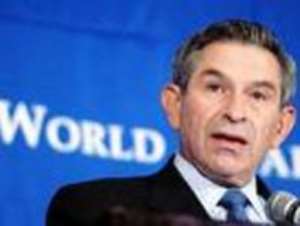
Paul D Wolfowitz ending a furor over favoritism that blew up into a global fight over American leadership, announced his resignation as president of the World Bank Thursday evening after the bank's board accepted his claim that his mistakes at the bank were made in good faith.
The decision came four days after a special investigative committee of the bank concluded that he had violated his contract by breaking ethical and governing rules in arranging the generous pay and promotion package for Shaha Ali Riza, his companion, in 2005.
The resignation, effective June 30, brought a dramatic conclusion to two days of negotiations between Mr. Wolfowitz and the bank board after weeks of turmoil.
"He assured us that he acted ethically and in good faith in what he believed were the best interests of the institution, and we accept that,” said the board"s directors in a statement issued Thursday night. “We also accept that others involved acted ethically and in good faith.”
In the carefully negotiated statement, the bank board praised Mr. Wolfowitz for his two years of service, particularly for his work in arranging debt relief and pressing for more assistance to poor countries, especially in Africa. They also cited Mr. Wolfowitz's work in combating corruption, his signature issue.
Mr. Wolfowitz said he was grateful for the directors' decision and, referring to the bank's mission of helping the world's poor, added: “Now it is necessary to find a way to move forward. To do that I have concluded that it is in the best interests of those whom this institution serves for that mission to be carried forward under new leadership.”
Mr. Wolfowitz's negotiated departure averted what threatened to become a bitter rupture between the United States and its economic partners at an institution established after World War II. The World Bank channels $22 billion in loans and grants a year to poor countries.
But he left behind a place that must heal its divisions and overhaul a flawed, cumbersome structure that had allowed the controversy over Mr. Wolfowitz to spread out of control.
People close to the negotiations said that Mr. Wolfowitz had agreed not to make major personnel or policy decisions between now and June 30. Some bank officials said he might go on an administrative leave and cede day-to-day functions to an acting leader. President Bush praised Mr. Wolfowitz at a news conference but signaled that the end was near by saying he regretted “that it's come to this.” A White House spokesman, Tony Fratto, said, “We would have preferred that he stay at the bank, but the president reluctantly accepts his decision.”
More important for the bank's future, Mr. Fratto said, President Bush will soon announce a candidate to succeed Mr. Wolfowitz, quashing speculation that the United States would end the custom, in effect since the 1940s, of the American president picking the bank president.
Many European officials previously indicated that they would go along with the United States' picking a successor if Mr. Wolfowitz would resign voluntarily, as he now has.
Treasury Secretary Henry M. Paulson Jr. said Thursday that he would “consult my colleagues around the world” before recommending a choice to Mr. Bush, in what seemed to be an effort to assure allies that the United States would not repeat what happened in 2005 when Mr. Bush surprised them by selecting Mr. Wolfowitz, then a deputy secretary of defense and an architect of the Iraq war.
Leaders of Germany and France objected but decided not to make a fight over the choice and risk re-opening wounds from their opposition to the war two years earlier. Some also argued that Mr. Wolfowitz, as a conservative seeking to write a new chapter in a career that had been focused on national security, might bring new support to aiding the world's poor.
Soon after Mr. Wolfowitz took office, he engaged in fights in various quarters at the bank over issues including his campaign against corruption, in which he suspended aid to several countries without consulting board members, and his reliance on a small group of aides.
Mr. Wolfowitz's resignation, while ending the turmoil that erupted in early April over the disclosure of his role in arranging Ms. Riza's pay and promotion package, will not by itself repair the divisions at the bank over his leadership, bank officials said Thursday evening.




 Ensure private schools employ professional teachers, not SHS graduates — Xandy K...
Ensure private schools employ professional teachers, not SHS graduates — Xandy K...
 Alan Kyeremanten was the brain behind Ghana Card not Bawumia — Hopeson Adorye
Alan Kyeremanten was the brain behind Ghana Card not Bawumia — Hopeson Adorye
 I'm not running for office for power prestige, I just want to solve Ghana’s prob...
I'm not running for office for power prestige, I just want to solve Ghana’s prob...
 Provide immediate assistance to our displaced residents — Oda Nkwanta residents ...
Provide immediate assistance to our displaced residents — Oda Nkwanta residents ...
 Send nurses abroad; it’s a better option than being unemployed in Ghana — NDC Pa...
Send nurses abroad; it’s a better option than being unemployed in Ghana — NDC Pa...
 Bawumia stole free tertiary education for Persons with Disabilities from NDC’s 2...
Bawumia stole free tertiary education for Persons with Disabilities from NDC’s 2...
 Ejisu by-election: Anger is bound to occur but return to your 'sweet home' — Nan...
Ejisu by-election: Anger is bound to occur but return to your 'sweet home' — Nan...
 Limited voters registration: Don't allow politicians to engage your minors for p...
Limited voters registration: Don't allow politicians to engage your minors for p...
 Ferry on Oti River breaks down; drivers and passengers stranded
Ferry on Oti River breaks down; drivers and passengers stranded
